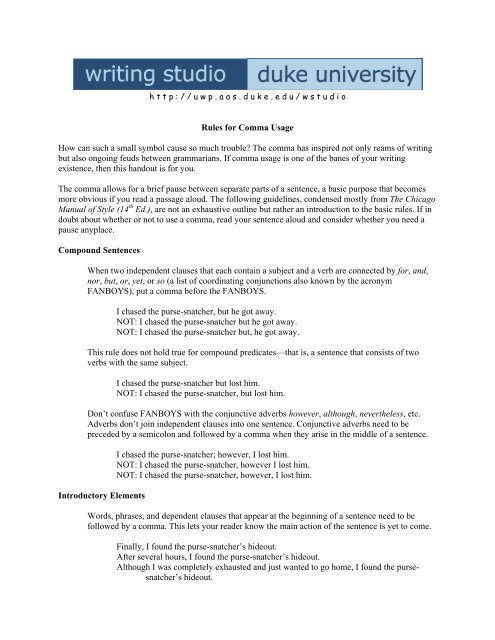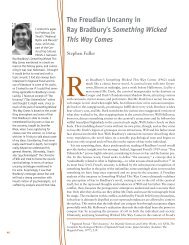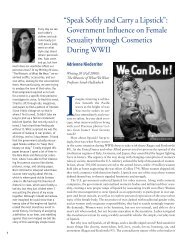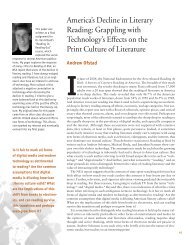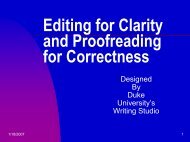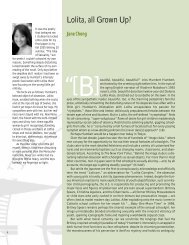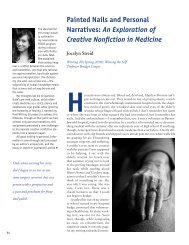Create successful ePaper yourself
Turn your PDF publications into a flip-book with our unique Google optimized e-Paper software.
h t t p : / / u w p . a a s . d u k e . e d u / w s t u d i o<br />
<strong>Rules</strong> <strong>for</strong> <strong>Comma</strong> <strong>Usage</strong><br />
How can such a small symbol cause so much trouble? The comma has inspired not only reams of writing<br />
but also ongoing feuds between grammarians. If comma usage is one of the banes of your writing<br />
existence, then this handout is <strong>for</strong> you.<br />
The comma allows <strong>for</strong> a brief pause between separate parts of a sentence, a basic purpose that becomes<br />
more obvious if you read a passage aloud. The following guidelines, condensed mostly from The Chicago<br />
Manual of Style (14 th Ed.), are not an exhaustive outline but rather an introduction to the basic rules. If in<br />
doubt about whether or not to use a comma, read your sentence aloud and consider whether you need a<br />
pause anyplace.<br />
Compound Sentences<br />
When two independent clauses that each contain a subject and a verb are connected by <strong>for</strong>, and,<br />
nor, but, or, yet, or so (a list of coordinating conjunctions also known by the acronym<br />
FANBOYS), put a comma be<strong>for</strong>e the FANBOYS.<br />
I chased the purse-snatcher, but he got away.<br />
NOT: I chased the purse-snatcher but he got away.<br />
NOT: I chased the purse-snatcher but, he got away.<br />
This rule does not hold true <strong>for</strong> compound predicates—that is, a sentence that consists of two<br />
verbs with the same subject.<br />
I chased the purse-snatcher but lost him.<br />
NOT: I chased the purse-snatcher, but lost him.<br />
Don’t confuse FANBOYS with the conjunctive adverbs however, although, nevertheless, etc.<br />
Adverbs don’t join independent clauses into one sentence. Conjunctive adverbs need to be<br />
preceded by a semicolon and followed by a comma when they arise in the middle of a sentence.<br />
Introductory Elements<br />
I chased the purse-snatcher; however, I lost him.<br />
NOT: I chased the purse-snatcher, however I lost him.<br />
NOT: I chased the purse-snatcher, however, I lost him.<br />
Words, phrases, and dependent clauses that appear at the beginning of a sentence need to be<br />
followed by a comma. This lets your reader know the main action of the sentence is yet to come.<br />
Finally, I found the purse-snatcher’s hideout.<br />
After several hours, I found the purse-snatcher’s hideout.<br />
Although I was completely exhausted and just wanted to go home, I found the purse-<br />
snatcher’s hideout.
This rule also applies to exclamations…<br />
Alas, he was not there.<br />
Damn, that purse-snatcher was fast.<br />
…and direct address:<br />
I’m sorry, ma’am, I lost him.<br />
Officer, I saw the whole thing.<br />
Parenthetical/Non-essential Elements<br />
Phrases or clauses that can be omitted from a sentence without changing its basic meaning should<br />
be set off by commas.<br />
The purse-snatcher, a small man, ran past me.<br />
The purse-snatcher, who wore a ski cap, ran past me.<br />
Here the in<strong>for</strong>mation about the purse-snatcher’s size and haberdashery is secondary to the main<br />
point of the sentence: he ran that way.<br />
Don’t be misled into setting off a restrictive clause with commas. A restrictive clause, usually<br />
introduced by that or who, gives essential in<strong>for</strong>mation, as opposed to a non-restrictive clause,<br />
which is introduced by which. That clauses don’t get commas, but which clauses do; in modern<br />
writing the distinction between which and that has been blurred, leading to occasional confusion<br />
over where to put the commas.<br />
The purse which was from DKNY was red.<br />
Although the above sentence is correct in common usage, it leads to confusion over meaning; it<br />
could be interpreted as meaning either of the following:<br />
The purse, which was from DKNY, was red. (The purse is important; its DKNY-ness<br />
is only mildly interesting)<br />
The purse that was from DKNY was red. (The DKNY purse, rather than any other purse,<br />
is important)<br />
To avoid this kind of confusion, always consider whether the in<strong>for</strong>mation contained in the phrase<br />
is essential.<br />
Coordinate Adjectives<br />
Two adjectives that modify one noun should be separated by commas if they both have the same<br />
descriptive <strong>for</strong>ce:<br />
The silly, frightened purse-snatcher dropped the purse with all its contents.<br />
However, adjectives should not be separated by a comma if they are not coordinate; that is, if<br />
they do not have the same importance as describers:<br />
I returned the purse to the little old lady from whom it was stolen.<br />
NOT: I returned the purse to the little, old lady from whom it was stolen.
In this example, little and old are not coordinate adjectives because old has more <strong>for</strong>ce than little:<br />
old lady runs together as a complete idea. The quick way to determine if two adjectives are<br />
coordinate is to put an and between them; if the phrase still sounds right, then you can replace the<br />
and with a comma. The silly and frightened purse-snatcher makes sense, so silly, frightened<br />
purse-snatcher is correct; by comparison, little and old lady doesn’t really mean the same thing as<br />
little old lady.<br />
Complementary or Antithetical Elements<br />
Two phrases that both refer to one word or share a function in a sentence should be separated by<br />
commas. This construction usually expresses contrast:<br />
Series and Lists<br />
I found the purse, not the purse-snatcher.<br />
The older, but still beautiful, owner of the purse was quite grateful.<br />
In a series consisting of three or more elements, the first two elements should always be separated<br />
by commas if they are not separated by conjunctions:<br />
The little old lady, the cop, and I all went down to the precinct.<br />
NOT: The little old lady, and the cop, and I all went down to the precinct.<br />
Sometimes, writers will drop the comma be<strong>for</strong>e the final conjunction in a series:<br />
The little old lady, the cop and I all went down to the precinct.<br />
This final comma is called a serial or Ox<strong>for</strong>d comma, because it used to be standard in British<br />
English but not in American English. Using the Ox<strong>for</strong>d comma is optional; however, if you have<br />
a particularly complicated series consisting of many elements, this comma can do a lot to<br />
eliminate confusion:<br />
Elliptical Constructions<br />
The little old lady whose red DKNY purse was stolen, the cop who was first on the scene<br />
and who didn’t do a damn thing to help me catch the purse-snatcher, and I all<br />
went down to the precinct.<br />
NOT: The little old lady whose red DKNY purse was stolen, the cop who was first on the<br />
scene and who didn’t do a damn thing to help me catch the purse-snatcher and I<br />
all went down to the precinct.<br />
Sometimes commas are used to indicate omitted material in a sentence that can be understood<br />
from context:<br />
The little old lady’s statement took <strong>for</strong>ty-five minutes; mine, four hours.<br />
However, if you don’t need these commas <strong>for</strong> clarity, don’t use them.
Quotations<br />
Questions<br />
Direct quotations of complete thoughts are often introduced by commas:<br />
The cop asked me, “What did you think you were doing, chasing that guy?”<br />
I responded, “Your job, since you weren’t doing it.”<br />
But when quotations are incorporated into sentences, they are punctuated according to the needs<br />
of the sentence:<br />
Telling the cop “Your job, since you weren’t doing it” might not have been the best idea.<br />
In more <strong>for</strong>mal prose, quotations are often introduced by colons rather than commas.<br />
When a sentence includes a direct question but does not solely consist of that question, the<br />
question is usually set off from the rest of the sentence using commas:<br />
I asked myself, how do I get myself in these situations?<br />
The cop wanted to know, who did I think I was?<br />
But when these questions come at the beginning of a sentence, the question mark does the<br />
comma’s job:<br />
When are they going to let me go home? I wondered.<br />
What was he doing on that street corner? the cop pondered.<br />
If the question is indirect, it doesn’t need commas:<br />
Titles, Addresses, and Dates<br />
I found myself wondering where that purse-snatcher was now.<br />
NOT: I found myself wondering, where that purse-snatcher was now.<br />
<strong>Comma</strong>s should be used to set off titles or positions following a name:<br />
Captain Bitko, head of the theft department, finally came to the interview room.<br />
<strong>Comma</strong>s should also come between the individual elements of an address:<br />
I told him I lived at 221B Baker Street, London, England.<br />
<strong>Comma</strong>s usually separate the date and the year if the day of the month is involved, but not if only<br />
the month and year are mentioned:<br />
I had arrived in Durham in May 2004.<br />
I had arrived in Durham on May 21, 2004.
But in the style preferred by the University of Chicago (also known as international or military<br />
<strong>for</strong>mat) there are no commas:<br />
A Final Thought…<br />
I had arrived in Durham on 21 May 2004.<br />
Sometimes, even after you apply all these rules, you still find yourself with a tangled sentence that needs<br />
some commas to straighten itself out. On the other hand, sometimes your prose becomes confused<br />
because you have too many commas. Usually, writers use either too many or too few commas<br />
consistently; if you find out what kind of writer you are, you can decide whether you ought to look <strong>for</strong><br />
commas to delete, or look <strong>for</strong> sentences that need more punctuation.


